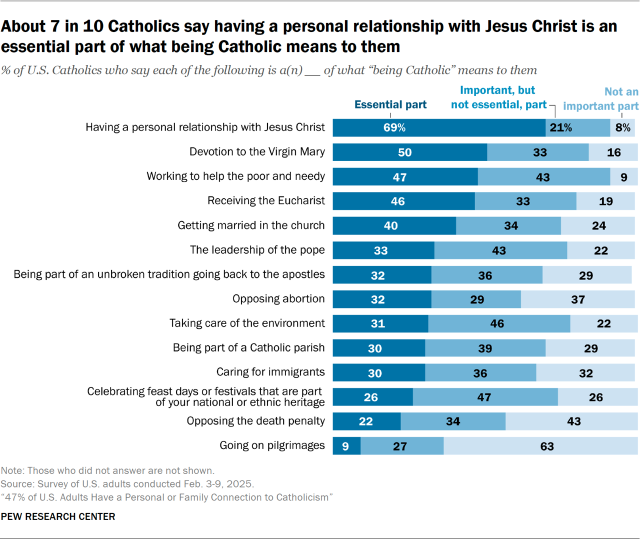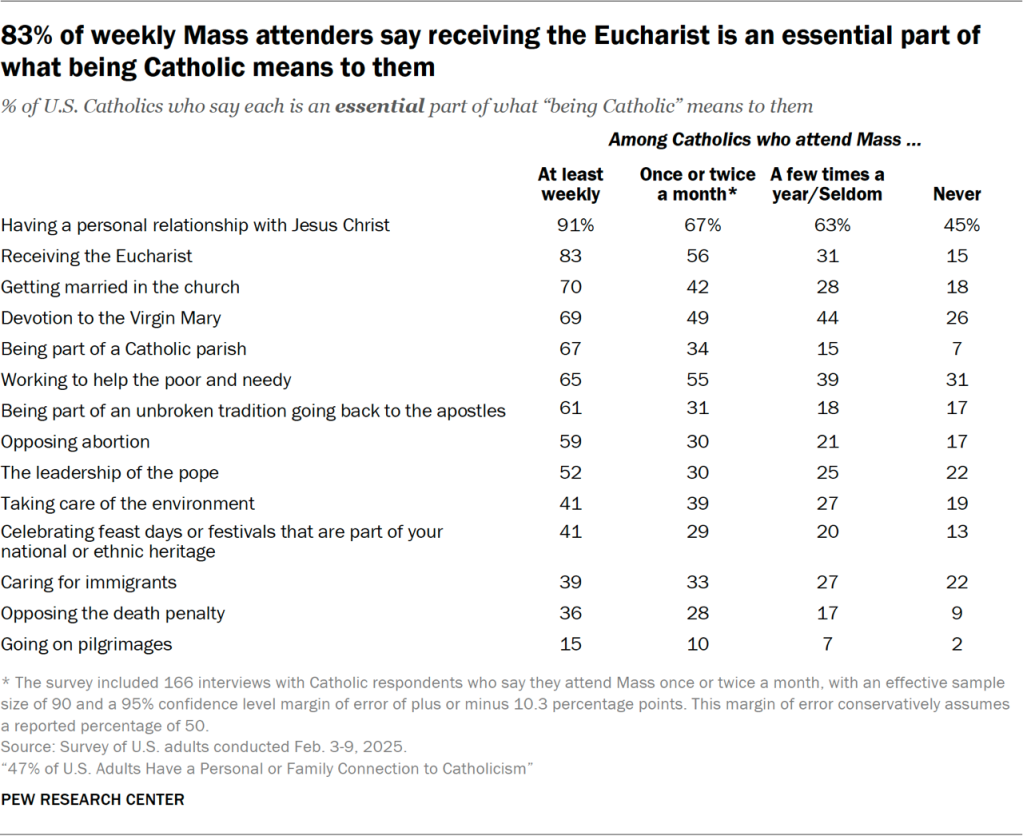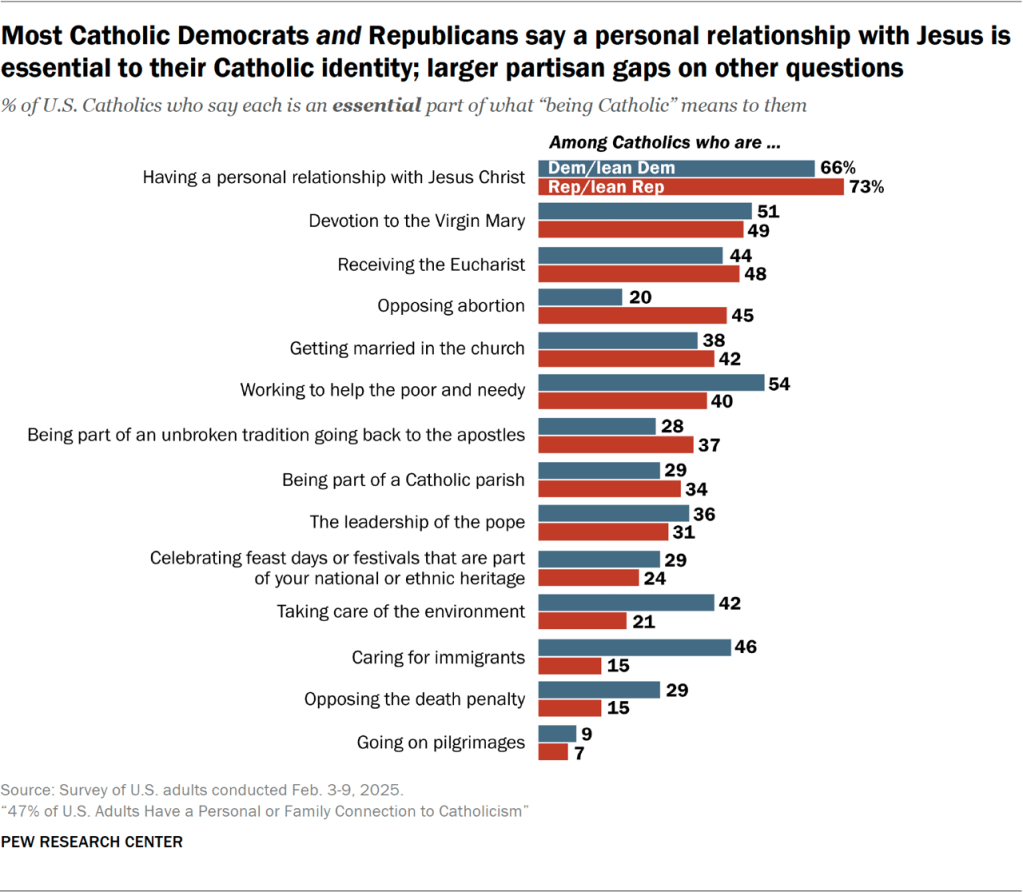To find out what U.S. Catholics see as the core elements of their own religion, we presented respondents with 14 items and asked them to say whether each one is an “essential,” an “important but not essential,” or “not an important” part of what “being Catholic means to you.”
Respondents had the option to describe more than one item as essential – or to say that none of the items are essential – to what being Catholic means to them. They also had a chance, at the end of this section of the survey, to mention anything else they view as essential to their Catholic identity.

(Pew Research Center previously has asked similar questions of a wide variety of religious groups, including in surveys of Jewish Americans in 2020 and 2013; a 2017 survey of Muslims; a 2015 survey of Catholics; a 2012 survey of members of the Church of Jesus Christ of Latter-day Saints, who are widely known as Mormons; and a 2016 survey of the general U.S. public.4)
In the present survey, about seven-in-ten U.S. Catholics say that “having a personal relationship with Jesus Christ” is an essential part of being Catholic for them.
Meanwhile, about half say that devotion to the Virgin Mary (50%), working to help the poor and needy (47%) and receiving the Eucharist (46%) are essential to their Catholic identity.
Some other beliefs and practices are viewed as essential by roughly a third of U.S. Catholics. Between 30% and 33% say the leadership of the pope, being part of an unbroken tradition going back to the apostles, opposing abortion, taking care of the environment, being part of a Catholic parish, and caring for immigrants are essential to what being Catholic means to them.
Answers to these questions tend to vary according to how often Catholics go to Mass. Those who attend weekly are generally more inclined than other Catholics to say that the 14 items we asked about are essential to their Catholic identity. For example, 83% of weekly Mass-attending Catholics say that receiving the Eucharist is essential, compared with 56% of Catholics who attend Mass once or twice a month, 31% who attend a few times a year or less often, and 15% who say they never attend Mass.
There are also differences between Hispanic Catholics and White Catholics on these questions. For example, compared with White Catholics, far more Hispanic Catholics say a personal relationship with Jesus, devotion to the Virgin Mary, caring for immigrants, and celebrating national or ethnic feast days are essential parts of what being Catholic means to them. (The survey sample did not include enough Black or Asian Catholics to allow their answers to be analyzed and reported separately.)
After presenting respondents with all 14 items, the survey asked whether there is anything else that is essential to what being Catholic means to them, inviting them to elaborate in their own words.
Most respondents (70%) did not volunteer any additional answers. Among those who gave additional answers, some of the more common responses were:
- Being kind to others (5% of all Catholics volunteered this as an essential component of what being Catholic means to them)
- Following the teachings of Jesus and/or the Bible (4%)
- Being ethical/moral (4%)
- Believing in God or Jesus (3%)
While the analysis in this chapter focuses mostly on what Catholics say is essential to their Catholic identity, the survey also gave respondents the option to say that various beliefs and practices are important but not essential to what being Catholic means to them.
When the essential and important but not essential categories are combined, it becomes clear that a majority of Catholics view 13 of the 14 items listed in the survey as either essential or important. The lone exception is “going on pilgrimages,” which roughly a third of U.S. Catholic adults view as essential (9%) or important but not essential (27%) to their Catholic identity.
For details on how subgroups of Catholics answered these questions, refer to the detailed tables.
For additional information on what Hispanic Catholics see as essential to being Catholic, jump to the relevant section in Chapter 4.
Read on about essentials of Catholic identity by:
Essentials of Catholic identity by Mass attendance
Weekly Mass attenders are generally more likely than Catholics who attend less frequently to say the items we asked about are essential to being Catholic for them.5
For example, 91% of Catholics who go to Mass at least weekly say that having a personal relationship with Jesus Christ is essential to what being Catholic means to them, compared with 67% of Catholics who go to Mass monthly and 63% of Catholics who go to Mass a few times a year or less often. Among Catholics who never go to Mass, 45% say having a personal relationship with Jesus is essential to their Catholic identity.

And 83% of weekly attenders say receiving the Eucharist is essential to their Catholic identity, compared with 56% of Catholics who go to Mass once or twice a month and less than half of Catholics who go to church a few times a year or less often.6
Essentials of Catholic identity by party identification
Catholic Democrats and independents who lean Democratic are more likely than Catholic Republicans and Republican leaners to view the following items as essential to their Catholic identity:
- Working to help the poor and needy (54% among Catholic Democrats vs. 40% among Catholic Republicans)
- Caring for immigrants (46% vs. 15%)
- Taking care of the environment (42% vs. 21%)
- Opposing the death penalty (29% vs. 15%)

Meanwhile, Catholic Republicans and Republican leaners (45%) are more likely than Catholic Democrats and Democratic leaners (20%) to say that opposing abortion is essential to what being Catholic means to them.
Majorities of Catholics in both parties say that having a personal relationship with Jesus Christ is essential to being Catholic for them, though Catholic Republicans are slightly more likely than Catholic Democrats to say this (73% vs. 66%).




